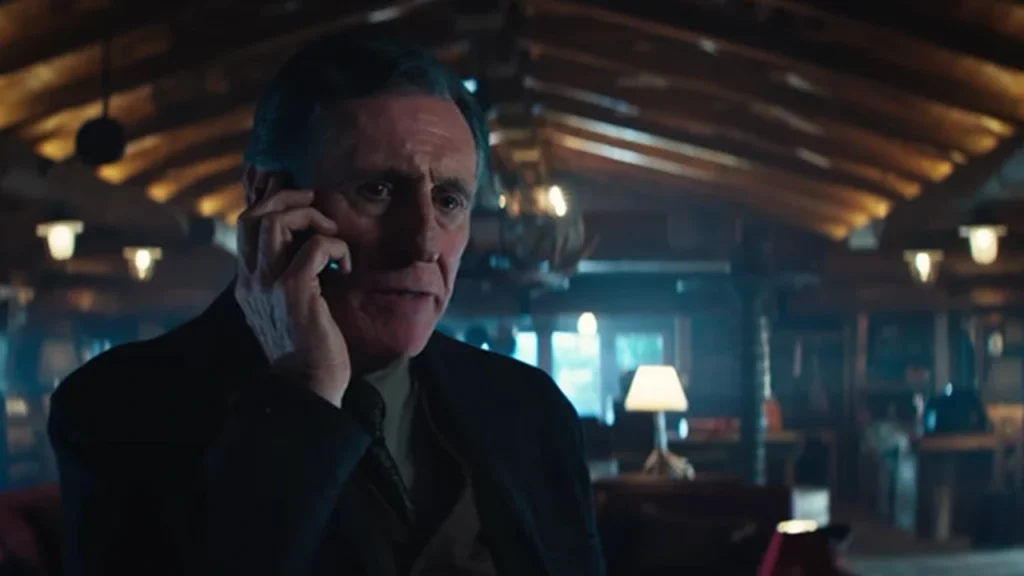
WARNING: THIS ARTICLE CONTAINS MAJOR SPOILERS
The predetermined moment in the Ballerina ending is when Eve finally catches up to The Chancellor, an elusive man with an ideological worldview about the lives they lead. Eve lets him talk for a bit–presumably out of hesitation to conclude revenge for her father’s death–and maybe a slight moment of doubt to hear what he has to say–before shooting him square in the head, dead.
Yet, Ballerina’s ending is not just about the action. It’s about the emotional resonance that some moments bring, resonating more deeply within the narrative. These moments, while open to interpretation, are worth the emotional payoff they bring.

The Absence of the Sister
During the final, rather explosive, act, Eve makes her way to the town of Hallstatt, which is made up of the population of the Cult, who try to live seemingly everyday family lives, while partaking in the assassins’ lifestyle outside of it, and raising children to be assassins inside of it. A compelling local economy that would make the sending of Christmas cards interesting.
In a twist, The Chancellor remembers Eve from when he and his assassins killed her father, Javier, and he informs Lena that she is Eve’s older sister–quite a kinship considering that both of them have been compelled to kill each other.
This twist is significant as it adds a layer of complexity to Eve’s character. It makes sense in the context of the writing because it is proposed earlier in the film. Eve has an emotional attachment to Tatiana, a former Kikimora trainee that Eve trained with, before being cast out due to the lack of viciousness within her–a key component if you want to survive this world.
Eve was dismayed about losing Tatiana, considering her as family–The Director, however, plainly explains to Eve that Tatiana was not fit for the lifestyle, and instead, she would be better off being a ballerina–hence why Eve is watching her friend in a ballet performance at the end of the film.
But Eve likely considered Tatiana as a sister, due to the absence of sisterhood–an emotional blackhole she’s had to endure since childhood, but subconsciously. And so, when Eve learns that Lena is her sister, it’s a confusing one, and temporarily, she has her family back in her life–temporary it is, since The Director tries to kill them both, which only leads to the death of Lena.
This makes the final scenes of Ballerina, where Eve watches Tatiana at a ballet performance, make even more sense, as she is eager to find that feeling of sisterhood again, even from a distance–whether Eve knows this as a conscious feeling is up for debate, but it drives her, even if it is minor to the overarching character development of the film.
The Chancellor and the System
Eve shoots The Chancellor square in the head in Hallstatt, which is likely the memory that most audiences will come away with from the film–it’s not the job of the assassin to hesitate, but Eve certainly does before pulling the trigger–a moment that would have failed her during training.
But why did she hesitate? Was it the relentless urge for revenge that forced her to confront her self-awareness before completing her rogue mission? Or was it something else? The Chancellor’s narcissistic speech, cut short by his brutal death, was a stark reminder that despite her revenge, nothing will change. His words were a persuasive attempt to stop Eve, but they ultimately failed. The Chancellor spoke about “the system,” and that even with him dead, nothing will change–someone else will take over, and the community of assassins that hold the same beliefs as he will still exist–children will still be raised with the same ideology.
As a macro point, what The Chancellor said applies to many “systems” in our world, but in relation to this story, it’s not out of the question that when the head of a crime organisation dies, someone else takes over–and that’s what The Chancellor was alluding to.
It’s telling that, in the first act, Eve was questioning whether to leave the life of an assassin, even confiding in John Wick, which is probably why The Chancellor’s words encouraged her to stop in her steps, even for a few seconds, before pulling the trigger–ultimately, a change in system was not her motivation–revenge for her father, was.

Gabriel Byrne (Photo: Lionsgate)
John Wick – A Step Too Far For Eve
Appeasing fans, but also appeasing the story, John Wick is tasked with hunting down and killing Eve in the third and final act of Ballerina–Eve has broken a pact between The Chancellor and The Director–and they are both fretting over the consequences if it gets ugly.
John Wick appears in the snowy wilderness of Hallstatt and asks Eve to leave before it gets ugly, but she refuses, resulting in them both fighting. Was it a fight, though? Hardly–John Wick is kind to Eve, continuously disarming her and showing that he could kill her at any moment.
This is a good element of the story–it would have been utterly shambolic if Eve could usurp the best assassin in the franchise for the sake of a standalone “World of John Wick” film. Eve did not meet her match; she met her final boss, and she was never going to win.
However, the most interesting aspect is that John Wick gives Eve until midnight to finish her mission and kill The Chancellor. Despite her time running out, he still does not kill her. John Wick understands the brutal and determined nature of revenge, and he surely relates, given his history. He provided Eve with the utmost respect in carrying out her reasons for revenge, even if it meant risking diplomacy and more bloodshed.
Self Sacrifice
Eve’s revenge mission led her to a life with a target on her back, forever, after she learns there is a large bounty to kill her (this presumption is based on whether we get a sequel or not). It’s this self-sacrifice that provides meaning in the film–to stick to her purpose, the only way she could be true to herself is if she carried out the revenge, which ultimately leads to being an outcast (the self-sacrifice).
But surprisingly, there’s little anxiety on the face of the character–little worry or concern–she leaves the theatre, where she was watching Tatiana on stage from afar, relaxed. The freedom of living within your truth is far better than being restrained in your purpose. Whatever she went through in Hallstatt relieved years of pain, confusion, and anger, deriving from a childhood that showed very little innocence, and only Hell. Eve reminds audiences that often, being true to ourselves can lead to devastating outcomes, but it’s not as devastating when you live a lie or exist without your actual purpose.


